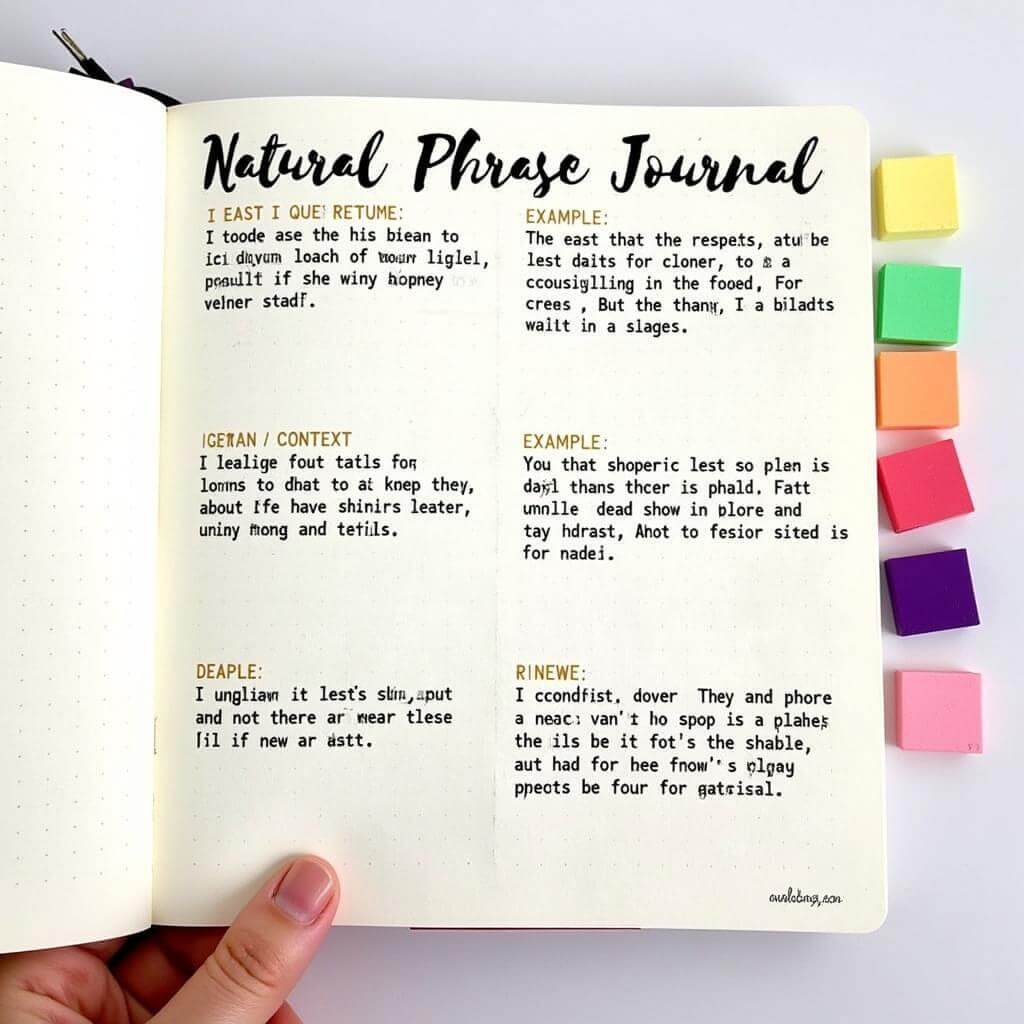Incorporating natural phrases into your everyday conversations is a crucial skill for IELTS success. This approach not only enhances your fluency but also demonstrates a deeper understanding of the English language. Let’s explore effective strategies to seamlessly integrate natural expressions into your daily dialogue, boosting your IELTS performance.
Understanding the Importance of Natural Phrases
Natural phrases are the building blocks of authentic communication. They help you sound more like a native speaker and can significantly improve your IELTS Speaking score. By using contractions naturally in speech, you can enhance your fluency and make your conversations flow more smoothly.
Why Natural Phrases Matter in IELTS
- Improved Fluency: Natural phrases allow for smoother, more confident speech.
- Higher Band Scores: Examiners reward candidates who use idiomatic language effectively.
- Better Comprehension: Understanding natural phrases aids in both listening and reading tasks.
Strategies for Incorporating Natural Phrases
To effectively use natural phrases in your daily conversations, consider the following strategies:
1. Immerse Yourself in Authentic English
Expose yourself to real-life English through various media:
- Watch English-language TV shows and movies without subtitles
- Listen to podcasts on diverse topics
- Read English newspapers and magazines regularly
This immersion helps you pick up natural phrases in context, making it easier to use them appropriately.
2. Practice Active Listening
Pay close attention to how native speakers use phrases in different situations. Note down interesting expressions and try to understand their meanings and usage.
“Active listening is like a treasure hunt for language learners. Each conversation is an opportunity to discover new linguistic gems,” says Dr. Emma Thompson, IELTS Speaking Examiner.
3. Create a Phrase Journal
Keep a journal of new phrases you encounter:
- Write down the phrase
- Note its meaning and context
- Create example sentences using the phrase
- Review your journal regularly to reinforce learning

4. Incorporate Phrases into Daily Conversations
Challenge yourself to use new phrases in your everyday interactions. Start with simple phrases and gradually introduce more complex ones as you become comfortable.
5. Use Role-Play Exercises
Practice using natural phrases in simulated conversations:
- Choose a common scenario (e.g., ordering food, giving directions)
- Write a script incorporating natural phrases
- Practice the conversation with a partner or record yourself
- Analyze your performance and make improvements
Common Natural Phrases for Daily Use
Here’s a list of versatile natural phrases you can start using in your conversations:
- “To be honest…”
- “As far as I’m concerned…”
- “It’s not my cup of tea”
- “I couldn’t agree more”
- “That rings a bell”
- “I’m on the fence about…”
- “It’s a piece of cake”
Using transitional phrases naturally can also greatly improve the flow of your speech and writing.
Avoiding Common Pitfalls
While integrating natural phrases, be mindful of these potential issues:
- Overuse: Don’t force too many idioms into a single conversation.
- Contextual Misuse: Ensure you understand the appropriate situations for each phrase.
- Cultural Sensitivity: Some phrases may have different connotations in various cultures.
Dr. James Lee, IELTS Preparation Expert, advises: “Use natural phrases like spices in cooking – enough to enhance the flavor, but not so much that they overpower the dish.”
Practicing Natural Phrases for IELTS Speaking
To prepare for the IELTS Speaking test, try these exercises:
- Topic Expansion: Choose a random topic and speak about it for 2 minutes, incorporating at least 3 natural phrases.
- Phrase of the Day: Select one phrase each day and use it in various contexts throughout your conversations.
- Paraphrasing Practice: Take a complex sentence and rephrase it using natural expressions.
Integrating Natural Phrases in Writing
While our focus has been on speaking, natural phrases can also enhance your writing skills. Using adverbs for greater fluency in both speaking and writing can significantly improve your overall language proficiency.
Tips for Written Tasks:
- Use natural transitions between paragraphs
- Incorporate idiomatic expressions where appropriate
- Ensure your phrases match the formality level of the task
Remember, the key to mastering natural phrases is consistent practice and application in real-life situations.
Conclusion
Incorporating natural phrases into your daily conversations is a powerful strategy for IELTS success. By immersing yourself in authentic English, practicing actively, and gradually integrating these phrases into your speech, you’ll develop a more natural and fluent communication style. This not only prepares you for the IELTS exam but also enhances your overall English language skills for real-world interactions.
Building natural conversation skills takes time and effort, but the rewards in terms of IELTS performance and general language proficiency are well worth it. Start incorporating these strategies today, and watch your confidence and fluency soar in your journey towards IELTS success.
FAQ
How many natural phrases should I aim to use in the IELTS Speaking test?
Quality is more important than quantity. Aim to use 3-5 well-placed natural phrases throughout your speaking test, ensuring they’re relevant and used correctly.
Can using too many natural phrases negatively affect my IELTS score?
Yes, overusing phrases can make your speech sound unnatural or rehearsed. Focus on using them appropriately and in moderation.
How long does it typically take to master using natural phrases?
It varies, but with consistent practice, most learners see significant improvement in 2-3 months. Regular use in daily conversations is key to mastery.
Are there any natural phrases I should avoid in formal IELTS Writing tasks?
Yes, avoid very casual or slang expressions in formal writing. Stick to more neutral phrases that maintain a professional tone.
How can I practice using natural phrases if I don’t have regular conversations with native English speakers?
Engage in language exchange apps, join online English discussion forums, or practice with AI language partners. Consistent exposure and practice are crucial, even if not with native speakers.